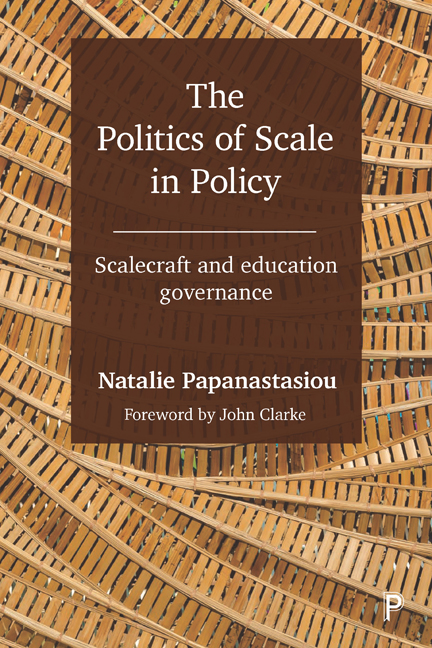Book contents
- Frontmatter
- Contents
- About the author
- Foreword
- Preface and acknowledgements
- 1 Policy, scale and the importance of space
- 2 Problematising scale in the study of policy
- 3 Exposing scale hegemonies
- 4 Knowledge, policy and scale
- 5 Hegemonies of statecraft and scale
- 6 Spatial entrepreneurs and scalecraft
- 7 The practice of scalecraft
- References
- Index
7 - The practice of scalecraft
Published online by Cambridge University Press: 27 April 2022
- Frontmatter
- Contents
- About the author
- Foreword
- Preface and acknowledgements
- 1 Policy, scale and the importance of space
- 2 Problematising scale in the study of policy
- 3 Exposing scale hegemonies
- 4 Knowledge, policy and scale
- 5 Hegemonies of statecraft and scale
- 6 Spatial entrepreneurs and scalecraft
- 7 The practice of scalecraft
- References
- Index
Summary
The book began by asking why, at a time when policy more than ever needs to reflect the deeply interconnected nature of political space, the privileged position of scale in the work of policymaking endures. A core part of exploring this puzzle has been to identify that despite the existence of a flourishing literature exploring the language and practices of policy, scale has remained unproblematised in the field of policy studies. As a result, the relationship between policy and scale, including the political dimensions of scale, have remained neglected. Focusing on the field of education policy and governance, the book has explored the political implications of scale in the armoury of policymakers by exploring a diverse range of empirical contexts. The empirical analysis has explored the relationship between hegemony, policy and scale from multiple angles that have included understanding powerful forms of knowledge, statecraft strategies and techniques of frontline work. Throughout its analysis, the book has integrated a critical approach to scale with the critical logics approach, and has developed the argument that ‘scalecraft’ is a powerful practice of policy which holds a central importance for establishing, sustaining and challenging hegemony. By understanding policymaking to involve practices of scalecraft, analysis has brought sharply into focus that scales – far from having stable meanings or fixed material boundaries – are strategically crafted in contexts of policymaking, and has demonstrated that scalecraft practices are a powerful and important dimension for understanding the production of policy.
This chapter reflects on the collective insights the book's empirical analysis has developed about the practice of scalecraft in Chapters 3 to 6. It will distil the core conceptual features of scalecraft and by doing so offer scholars of policy a clear framework for integrating a critical approach to scale in their analyses. The chapter also discusses how scalecraft contributes to the wider literatures of policy studies, political geography and education governance. The book concludes by outlining the potential that lies in future work engaging with conceptualisations of spatial politics that go beyond scale. Recognising the politics of scale in policy is one step towards addressing the spatial blind spot of policy studies – interdisciplinary work which engages with other political manifestations of space is essential for understanding the full complexity and significance of spatial politics in policymaking.
- Type
- Chapter
- Information
- The Politics of Scale in PolicyScalecraft and Education Governance, pp. 107 - 128Publisher: Bristol University PressPrint publication year: 2019

